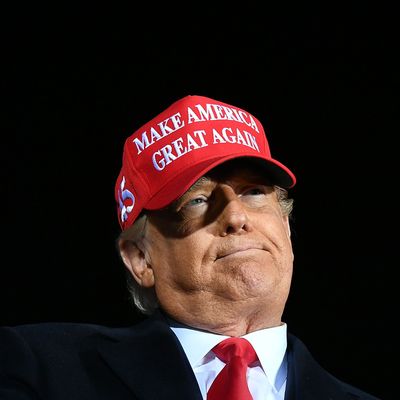
As tonight’s deadline set by Nancy Pelosi (and by legislative logistics) for a big new preelection COVID-19 relief and stimulus deal approaches, there’s a lot of justified skepticism about the possibility of Pelosi and administration negotiator Steven Mnuchin eliminating the gap between their positions on an array of money and policy issues with so little time remaining. But most observers seem to be focused on Republican opposition to a deal, as illustrated by this insider remarks from Politico Playbook:
THE LEVEL OF DISTRUST in MNUCHIN among Republicans is hard to overstate. Republicans in the White House, House and Senate think he’s a sellout, and believe he’ll do anything to get a deal — even if it means rolling over on some long-held GOP orthodoxy. Republicans involved in the talks said he has already agreed to more than $1.9 trillion in spending — including a new $60 billion rental assistance program. And they are concerned he will cave to PELOSI on a big state-and-local-funding package, as well.
So before the deal does or doesn’t go down, let’s briefly examine why Mnuchin and his boss the president might want to “cave to Pelosi.”
All you really need to know is in the latest gold-standard national survey from the New York Times/Siena College combine. The top-line numbers in this poll are almost exactly in line with national polling averages: it shows Biden leading Trump among likely voters by a 50-41 margin (Libertarian Jo Jorgensen, included in this poll for the first time, receives two percent, and the Green Party’s Howie Hawkins a negligible share of the vote). Biden leads Trump among seniors by 10 points; women by 23 points; and college-educated white voters by 19 points. Forty-eight percent of likely voters have a very unfavorable opinion of the president, which means they have all but written off any possibility of voting for him.
But of all the litany of challenges that these findings present to Trump’s reelection, this may be the biggest:
With just two weeks left in the campaign, Mr. Trump does not hold an edge on any of the most pressing issues at stake in the election, leaving him with little room for a political recovery absent a calamitous misstep by Mr. Biden, the Democratic nominee, in the coming days. The president has even lost his longstanding advantage on economic matters: Voters are now evenly split on whether they have more trust in him or Mr. Biden to manage the economy.
An advantage on the economy has always been the not-so-slender reed on which Trump’s reelection prospects have depended, before and during the COVID-19 pandemic. There’s been incessant debate as to whether that advantage outweighed increasingly negative public assessments of Trump’s personal conduct and his handling of other key issues, especially COVID-19. But that advantage never vanished as it may be doing now.
The same poll suggests pretty strongly what Trump might do to at least marginally salvage his economic management reputation. Asked if they favor “[a] new 2 trillion dollar stimulus package to extend increased unemployment insurance, send stimulus checks to most Americans, and provide financial support to state and local governments,” likely voters indicated support by a 72-21 margin, with 56 percent of self-identified Republicans and 67 percent of independents responding positively. There hasn’t been a lot of specific polling on additional stimulus measures late this year, but what we have is similar: a Gallup finding in September showing 70 percent of Americans (including majorities of Republicans and independents) favoring a second stimulus check along the lines of the $1200 payments made in the CARES Act; and a Global Strategy Group survey the same month showing 89 percent of Americans (and 91 percent in battleground states) supporting “an additional coronavirus economic assistances package.”
Whatever conservatives like Ron Johnson and Rand Paul think of a big new stimulus deal, it’s very popular. No, a second $1,200 check or rental assistance or renewed supplemental unemployment insurance won’t get into the pockets of voters or the bloodstream of the economy fast enough to make a palpable impact before election day. But it could on the margins help change the image of the president who signed a stimulus bill. Now he’s increasingly perceived as this out-of-control cartoon character who is out of touch with the country’s needs and incapable of seeing beyond the imaginary world of right-wing media and his own Twitter feed. Anything he can do to change that is priceless to his slim reelection prospects.
If that means quickly giving Nancy Pelosi whatever is necessary to seal a deal, the famously narcissistic president would be well advised to do it and then worry about imposing a deal on the rancorous Senate Republicans who aren’t on the ballot this year and may already be relearning the fiscal hawk songbook in preparation to obstruct the agenda of a Biden administration. Perhaps Trump will decide he needs a united party more than he needs a final talking point for the electorate, and maybe he’s even looking ahead himself to a 2024 comeback run in which conservative support will be crucial. Otherwise he should tell Steven Mnuchin to cave right now.






























